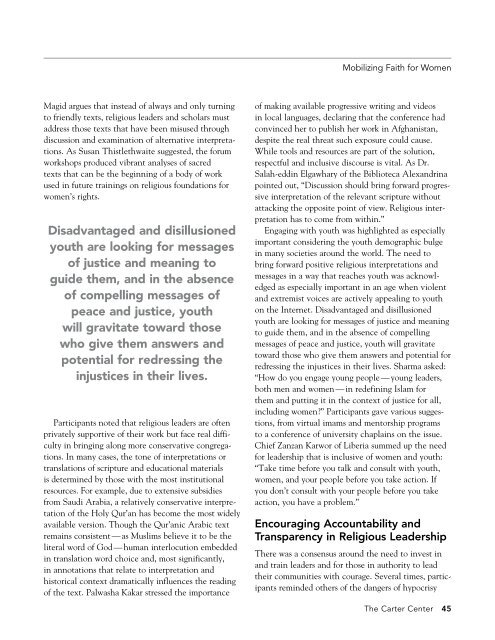v1E3z
v1E3z
v1E3z
You also want an ePaper? Increase the reach of your titles
YUMPU automatically turns print PDFs into web optimized ePapers that Google loves.
Mobilizing Faith for WomenMagid argues that instead of always and only turningto friendly texts, religious leaders and scholars mustaddress those texts that have been misused throughdiscussion and examination of alternative interpretations.As Susan Thistlethwaite suggested, the forumworkshops produced vibrant analyses of sacredtexts that can be the beginning of a body of workused in future trainings on religious foundations forwomen’s rights.Disadvantaged and disillusionedyouth are looking for messagesof justice and meaning toguide them, and in the absenceof compelling messages ofpeace and justice, youthwill gravitate toward thosewho give them answers andpotential for redressing theinjustices in their lives.Participants noted that religious leaders are oftenprivately supportive of their work but face real difficultyin bringing along more conservative congregations.In many cases, the tone of interpretations ortranslations of scripture and educational materialsis determined by those with the most institutionalresources. For example, due to extensive subsidiesfrom Saudi Arabia, a relatively conservative interpretationof the Holy Qur’an has become the most widelyavailable version. Though the Qur’anic Arabic textremains consistent — as Muslims believe it to be theliteral word of God — human interlocution embeddedin translation word choice and, most significantly,in annotations that relate to interpretation andhistorical context dramatically influences the readingof the text. Palwasha Kakar stressed the importanceof making available progressive writing and videosin local languages, declaring that the conference hadconvinced her to publish her work in Afghanistan,despite the real threat such exposure could cause.While tools and resources are part of the solution,respectful and inclusive discourse is vital. As Dr.Salah-eddin Elgawhary of the Biblioteca Alexandrinapointed out, “Discussion should bring forward progressiveinterpretation of the relevant scripture withoutattacking the opposite point of view. Religious interpretationhas to come from within.”Engaging with youth was highlighted as especiallyimportant considering the youth demographic bulgein many societies around the world. The need tobring forward positive religious interpretations andmessages in a way that reaches youth was acknowledgedas especially important in an age when violentand extremist voices are actively appealing to youthon the Internet. Disadvantaged and disillusionedyouth are looking for messages of justice and meaningto guide them, and in the absence of compellingmessages of peace and justice, youth will gravitatetoward those who give them answers and potential forredressing the injustices in their lives. Sharma asked:“How do you engage young people — young leaders,both men and women — in redefining Islam forthem and putting it in the context of justice for all,including women?” Participants gave various suggestions,from virtual imams and mentorship programsto a conference of university chaplains on the issue.Chief Zanzan Karwor of Liberia summed up the needfor leadership that is inclusive of women and youth:“Take time before you talk and consult with youth,women, and your people before you take action. Ifyou don’t consult with your people before you takeaction, you have a problem.”Encouraging Accountability andTransparency in Religious LeadershipThere was a consensus around the need to invest inand train leaders and for those in authority to leadtheir communities with courage. Several times, participantsreminded others of the dangers of hypocrisyThe Carter Center 45


